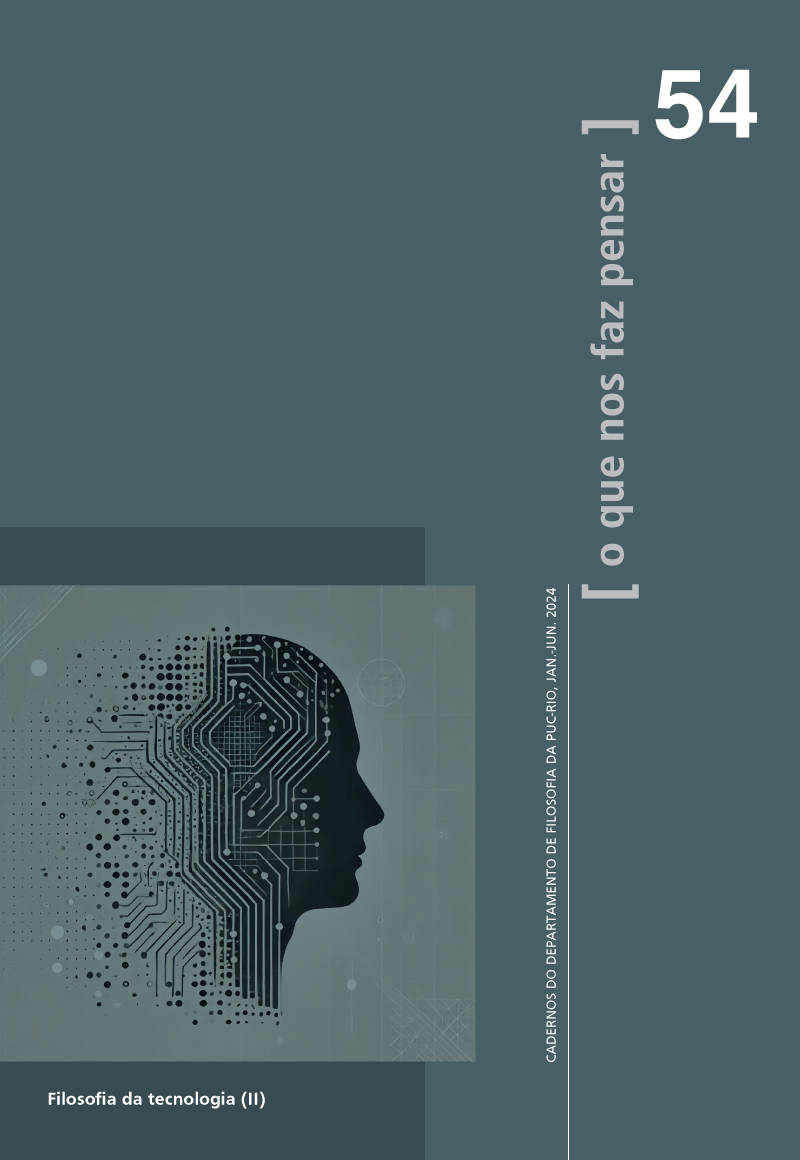O Chat GPT como Iceberg Digital – considerações educacionais
Conteúdo do artigo principal
Resumo
A popularização dos LLMs (Large Language Models) ao final de 2022 foi marcada por um misto de alarme e excitação por parte das instituições de ensino e pesquisa. O presente artigo avança uma interpretação e possível reação ao fenômeno. A hipótese é que a capacidade de atendimento desses dispositivos a demandas cognitivas muitos diversas abre uma inusitada janela de oportunidade para repensar tanto a produção de conhecimento, quanto as correntes práticas de ensino e aprendizagem. A perspectiva de aprimoramento acelerado e continuado dessas tecnologias torna tal reflexão ainda mais estratégica e urgente.
Detalhes do artigo

Este trabalho está licenciado sob uma licença Creative Commons Attribution-NonCommercial 4.0 International License.
Nota de Direitos Autorais
O autor do artigo ou resenha submetido e aprovado para publicação autoriza os editores a reproduzi-lo e publicá-lo na a revista O que nos faz pensar, entendendo-se os termos "reprodução" e "publicação" conforme a licença Creative Commons Atribuição-NãoComercial 4.0 Internacional. O artigo ou resenha poderá ser acessado tanto pela rede mundial de computadores (WWW – Internet), como pela versão impressa, sendo permitidas, a título gratuito, a consulta e a reprodução do texto para uso próprio de quem a consulta. Essa autorização de publicação não tem limitação de tempo, ficando os editores da revista O que nos faz pensar responsável pela manutenção da identificação do autor do artigo.
Referências
BENDER, Emily M., GEBRU, Timnit, MCMILLAN-MAJOR, Angelina, and SCHMITCHELL, Margaret. On the Dangers of Stochastic Parrots – can language models be too big? In Conference on Fairness, Accountability, and Transparency (FAccT ’21), March 3–10, 2021, Virtual Event, Canada. ACM, New York, NY, USA, https://doi.org/10.1145/3442188.3445922
CARR, Nicholas. A Geração Superficial – o que a internet está fazendo com nossos cérebros. São Paulo, Agir, 2019.
COECKELBERGH, Mark. Ética na IA, tradução de Clarisse de Souza, Edgar Lyra, Matheus Ferreira e Waldyr Delgado. Rio de Janeiro, UBU/Editora PUC, 2023.
SOUZA, Clarisse Sieckenius. Leitura Direta e Leitura Informatizada com o Voyant. EMAPS-Notas #05 10 p. Rio de Janeiro, SERG, Departamento de Informática, PUC-Rio, 2024. 10p. URL da versão impressa. http://www.hcc.inf.puc-rio.br/EMAPS/userfiles/downloads/Notas-deSouzaEstudoVoyant2024.pdf
CRAWFORD, Kate and JOLER, Vladan. Anatomy of an AI System. Share Lab and AI Now Institute, NYU, 2018.
DESMURGET, Michel. A Fábrica de Cretinos Digitais – os perigos das telas para nossas crianças. São Paulo, Vestígio, 2021.
DEWEY, John. Method in Science Teaching, General Science Quarterly, vol.1, n.1, 1916.
_______. Science as Subject-Matter and as Method, Science, jan. 28, 1910 (trad. Edgar Lyra, Ciência como Assunto e como Método, O que nos faz pensar, Rio de Janeiro, v.29, n.48, jan.-jun.2021.
DONKER, Tijbbe. The dangers of using large language models for peer review. The Lancet – Infectious Disease. Vol 23 July 2023, p.781.
EU Artificial Intelligence Act. Publicado em 12/06/2024. Disponível em https://artificialintelligenceact.eu/the-act/, último acesso em 22/10/2024.
FREIRE, Paulo. Pedagogia da Autonomia: saberes necessários à prática educativa. São Paulo, Paz e Terra, 2011.
GEFEN, Alexandre. Vivre avec le Chat GPT. Paris, L’Observatoire, 2023.
GLASS, Erin. Software of the Oppressed: reprogramming the invisible discipline. PhD Thesis. New York, Cuny University, The Graduate Center, 2018.
GRAD, Peter. Large language models prove helpful in the peer-review process. Phys. org, October 2023. Disponível em https://phys.org/news/2023-10-large-language-peer-review.html#google_vignette
HEIDEGGER, M. A Questão da Técnica. In ________. Ensaios e Conferências. Petrópolis, Vozes, 2003.
MESSERI, Lisa and CROCKETT, M. Artificial intelligence and illusions of understanding in scientific research. Nature | Vol 627 | 7 March 2024 https://doi.org/10.1038/s41586-024-07146-0
MEYER, E. T., § SCHROEDER, R. Knowledge machines: digital transformations of the sciences and humanities. Massachusetts, The MIT Press, 2015.
MONEA, Alexander. Graph Force: Rhetorical Machines and the N-Arization of Knowledge.” Computational Culture 5 (15th January 2016). Disponível em http://computationalculture.net/graph-force-rhetorical-machines-and-the-n-arization-of-knowledge/,último acesso em 22/10/2024.
OPEN AI. Disponível em https://openai.com/blog/chatgpt/, último acesso em 22/10/2024
PACHECO, Rodrigo: Senado Federal. Em tramitação. Disponível em https://www25.senado.leg.br/web/atividade/materias/-/materia/157233, último acesso em 22/19/2024.
ROCKWELL, Geoffrey and SINCLAIR, Stefan. Hermeneutica: computer-assisted interpretation in the humanities. Massachusetts, MIT Press, 2022.
SCIENCES PO NEWS 2023. Disponível em https://newsroom.sciencespo.fr/sciences-po-bans-the-use-of-chatgpt/ , último acesso em 22/10/2024.
SIMANOWSKI, Roberto. Smartphone Zombies. In The Death Algorithm and Other
Digital Dilemmas, the MIT Press, Massachusetts, 2018, p. 47-63.
VAN DIS, A. M. E., BOLLEN, Johan, VAN ROOIJ, Robert, ZUIDEMA, Willem § BOCKTING, L. Chat GPT: five priorities for research”. In Nature | Vol 614 | 9 February VAN NOORDEN, Richard. “More than 10,000 research papers were retracted in 2023 – a new record. Nature 624, 479-481 (2023).
VEE, Annette. “Full Stack Rhetoric – a response to rhetorical machines”. In JONES, John and e HIRSU, Lavinia. Rhetorical Machines – writing, code and computational ethics. The University of Alabama Press, Tuscaloosa, 2019.
ZHANG, Y., LI, Y. et al. Siren’s Song in the AI Ocean: a survey on hallucination in Large Language Models. In arXiv:2309.01219v2 [cs.CL] 24 Sep 2023.
WIKIPEDIA. Publish or perish. Disponível em https://en.wikipedia.org/w/index.php.title=Publish_or_perish&oldid=1239516132, último acesso em 22/10/2024.

